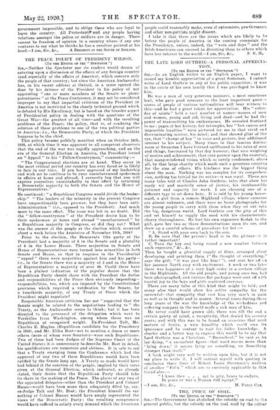THE PEACE POLICY OF PRESIDENT WILSON. (TO THE EDITOR OF
THE " SPECTATOR.") Sis,—Neither the Spectator nor its readers would dream of entering upon a discussion of the affairs of any foreign country (and especially of the affairs of America), which concern only the people of that country; but since the American Ambassador has, in his recent address at Oxford, in a sense opened the door by his defence of the President in his policy of not appointing "one or more members of the Senate as pleni- potentiaries " at the Peace Conference, it may not be considered improper to say that impartial criticism of the President in America is not restricted to the closely technical ground which is debated by His Excellency, but is based on the broader aspect of Presidential policy in dealing with the questions of the Great War—the greatest of all time—and with the resulting problems of the Peace; the policy, that is, of confining the solution of these problems to one of the two political parties in America—i.e., the Democratic Party, of which the President happens to be the chief.
This policy became publicly manifest when on October 24th, 1918, at which time it was apparent to all competent observers that the end of the war was rapidly approaching, and on the eve of the General Election in America, the President issued an "Appeal " to his "Fellow-Countrymen," commencing :- " The Congressional elections are at hand. They occur in the most critical period our country has ever faced or is likely to face in our time. If you have approved of my leadership and wish me to continue to be your unembarrassed spokesman in affairs at home and abroad, I earnestly beg that you will express yourselves unmistakably to that effect by returning a Democratic majority to both the Senate and the House of Representatives."
He continued : " a Republican Congress would divide the leader- ship." " The leaders of the minority in the present Congress have unquestionably been pro-war, but they have been anti- Administration " (i.e., opposed to the President). And much more to the same effect. The issue was left in no doubt. Did the " fellow-countrymen " of the President desire him to be their spokesman at home and abroad " unembarrassed " by a Republican majority in Congress, or did they not? What was the answer of the people at the election which occurred about a week before the Armistice of November 11th, 1918?
Prior to the election, the Democrats (the party of the President) had a majority of 6 in the Senate and a plurality of 6 in the Lower House. These majorities in Senate and House of Representatives were turned into minorities in both Senate and Houie, so that in response to the Presidential " appeal" there were majorities against him and his party- i.e., in the Senate there was a majority of 2 and in the House of Representatives a majority of over 40. Could there have been a plainer indication of the popular desire that the Republican Party should share with the President the duties and responsibilities of the Peace then obviously impending— responsibilities, toe, which are imposed by the Constitutional provision which required a ratification by the Senate, by a two-thirds majority, of any Treaty of Peace which the President might negotiate?
Responsible American criticism has not "suggested that the Senate might be related to the negotiations leading to " the Treaty, as the Ambassador seems to think; but it has been directed to the personnel of the delegation which went to Verslilles from Washington, among whom there was no Republican of recognized weight. Ex-President Taft, Mr. Charles E. Hughes (Republican candidate for the Presidency in 1916), and Mr. Elihu Root—not to mention a dozen or more others (none of whom were Senators)—were such Republicans. Two of these had been Judges of the Supreme Court of the United States; it is unnecessary to describe Mr. Root in detail, his qualifications- are numerous and obvious. It is safe to say that a Treaty emerging from the Conference which had the approval of any two of these Republicans would have been ratified by the Senate long ago. A Treaty so made would have had behind it the sanction of the people, implied by their votes given at the General Election, which indicated, as already stated, their desire that the Republican Party should take its share in the making of the Peace. The places of any two of the appointed delegates—other than the President and Colonel House—would have been more than adequately filled by, say, ex-Judge Taft and Mr. Root; the President himself (to say nothing of Colonel House) would have amply represented the views of the Democratic Party: the resulting compromise would have sufficed to satisfy every demand which the American
people could reasonably make, even if extremists, pro-Germans, and other non-patriots might dissent.
I take it that these are the issues which are likely to be before the people of America in the coming campaign for the Presidency, unless, indeed, the " wets and drys " and the Irish-Americans can succeed in divetting them to others which have less interest to the world.—I am, Sir, &c., S. R. H,


































 Previous page
Previous page